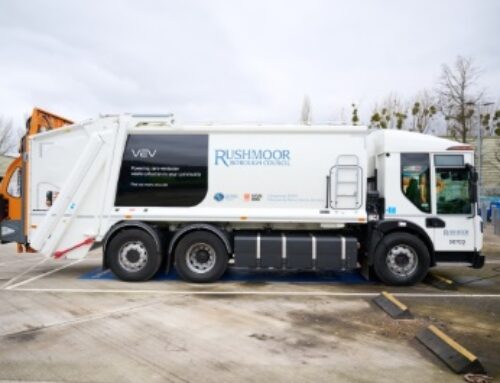Fleet operators could test their own vehicles

Currently, only DVSA examiners can carry out annual roadworthiness tests on heavy vehicles. (Image DVSA Crown copyright)
The Department for Transport (DfT) has published its motoring services strategy, in which it outlines how its three executive motoring agencies – the Driver & Vehicle Standards Agency (DVSA), Driver & Vehicle Licensing Agency (DVLA) and Vehicle Certification Agency (VCA) – will operate in the future.
Of particular interest to the freight sector are the suggestion that the off-road component of LGV driving tests could be examined by third parties rather than DVSA examiners, and the possibility that employees of private companies will be allowed to perform annual roadworthiness tests on heavy vehicles – including, potentially, their own.
Entitled Safe, Secure, Sustainable, the document highlights the progress of DVSA in divesting itself of much of its network of publicly-owned vehicle testing stations.
It outlines aims to continue to expand the network of authorised testing facilities (ATFs) for trucks and buses – of which there are now more than 500 nationwide, owned by hauliers, PSV operators, councils, dealerships and commercial workshops – and also explicitly states that the tests themselves may in future be carried out by qualified individuals who are not DVSA employees.
Currently, though ATFs are privately owned, only DVSA examiners can conduct the actual annual tests.
The report says: “We are currently looking at whether some of the vehicle testing currently conducted by DVSA examiners could be performed by suitably qualified examiners in the private sector.
“Firms already test their own light vehicles under the main MOT provisions; we are examining whether a similar approach would be suitable in relation to other categories of vehicles.”
Acknowledging concerns over difficulties in recruiting sufficient new truck drivers, the motoring services strategy looks at ways of increasing the capacity for testing new entrants. It makes a commitment to “timely test slot availability” and examines the possible separation of the on-highway and off-highway (reversing) elements of the practical driving test, and liberalising test provision.
Currently, companies with operating licences, and the emergency services, can employ their own truck or bus driving test examiner (a so-called delegated examiner) – but the individual must conduct 40 driving tests a year, and the candidates must all be employees of the company that he works for.
This provision is to be retained, but will possibly be extended to allow the testing of employees of other operators’ employees. Currently the 40-test threshold makes it impossible for all but the largest of companies to employ their own driving test examiner.
Turning to periodic training, the report admits that: “In its early days, driver training for the Certificate of Professional Competence (CPC) had a mixed reputation in the industry…
“We believe that, properly planned and utilised, it can play a significant part in making roads safer and reducing pollution through eco-driving.
“We will explore how the value of CPC can be better communicated in the industry, and whether CPC components can be aligned with recognised NVQ courses (or vice versa) while still meeting EU requirements. The haulage and passenger carrying industries are best placed to design, and thus improve, the quality of training.”
The report considered, and rejected, calls from the House of Commons transport select committee, to make ‘vulnerable road user’ (cyclist and pedestrian) awareness training a compulsory part of the Driver CPC syllabus – calling such a requirement “overly burdensome” – but says that DVSA is working with industry to encourage trainers to cover the topic where appropriate to the course subject.
With regard to business users generally, the DfT is aiming to make its agencies more company-friendly, pointing out that many of the current public-facing systems are optimised for the use of a private individual with one or two vehicles, and are rather more difficult to navigate for a commercial concern with a large fleet of cars, vans and trucks.
It acknowledges that: “for professional drivers and commercial enterprises, delays in service delivery by the agencies is not just an inconvenience, but a threat to their livelihood.”
The operator licensing system is singled out for improvement, with major innovations coming later this year. The ‘Earned Recognition’ scheme for reputable operators – which will see those with strong compliance records open up their vehicle and driver data to remote access by DVSA – will be offered to all eligible companies that wish to take it up.
Small bodybuilders and the like are assured that VCA (the vehicle approval body) will remain as a ‘one-stop shop’ for vehicle examination and approval.
The DfT is also looking for opportunities to save money by sharing ‘back office’ facilities between its various agencies.
Some of the proposals have been welcomed by industry groups. The Road Haulage Association (RHA) said it had “given a clear lead in lobbying” for the move towards ATF staff, rather than just DVSA examiners, being able to perform annual tests – adding that it had “urged the Department to press ahead with the change as a priority” since it would “boost investment in equipment and training.”
James Firth, head of licensing policy and compliance information at the Freight Transport Association FTA) said: “We are pleased that government has committed to have a proper look at allowing non-government employees to examine the LGV annual roadworthiness test. Many FTA members have been asking for this for some years.
“Our members are all agreed that standards and safety must come first, but if done in the right way this could offer tremendous flexibility for the industry,” he said.
Mr Firth also welcomed the proposal to liberalise driving test provision, saying that increasing availability of delegated examiners would “increase uptake and availability of driving tests to people trying to get into the industry.”
He pointed out that of the 100 or so delegated examiners in the country, only two were currently operating in the LGV sector, because “road freight companies are too small to be able to satisfy the existing requirements.”
Operators can read the report in full here.











